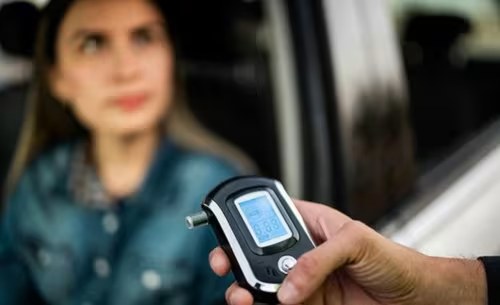Disclaimer: This guest post was written by a third party and is for informational purposes only. It does not constitute legal advice or create an attorney-client relationship with The Meehan Law Firm. For legal advice, please contact our office.
.webp)
.webp)
The Investigation
Most drivers who are investigated for DUI are pulled over for swerving, weaving in or out of their lane, speeding, or having been involved in a car accident. Officers will begin a DUI investigation if they smell alcohol or if you admit to drinking alcohol. The officer will likely request that you perform field sobriety tests and to submit to a breathalyzer test before deciding whether an arrest is warranted. After this, officers might start the DUI process by arresting the driver. The DUI process can also include booking, DUI court proceedings, and sentencing.
Booking / Release
Even if officers book you (which includes fingerprinting, mugshot and obtaining identifying information), most people will be released immediately or after spending a few hours in a holding cell. Most of the time, posting bail is not required, especially for a first offense where there are no collision/injuries, and no other charges.
Officers will provide you with a temporary license (pink piece of paper) which is initially valid for 30 days and a citation/notice to appear in court for an arraignment at a later date.
DMV Hearing (Admin Per Se)
A DUI arrest will prompt a parallel process called an Admin Per Se hearing which is independent from the court proceedings. This hearing must be requested timely after the arrest so that a stay of suspension is imposed, meaning your privileges to drive will remain valid pending the outcome of the hearing. The hearing will usually take place within several months of the arrest and will likely be conducted before the court proceedings are resolved.
Even if the DMV decides to suspend your license, you may be eligible to obtain a restricted license depending on the circumstances, excluding if the DMV alleged that you refused to submit to a chemical test, if you were under 21 years of age while arrested for DUI or if you have a commercial driver license, among other circumstances. Obtaining a restricted license requires enrolling in a DUI program, obtaining an SR22 insurance policy, paying fees to the DMV, and could include installation of a breathalyzer in your car (Interlock Ignition Device).
DUI Court Proceedings
Misdemeanor DUI charges for a first offense will usually require several months to resolve in court necessitating several court dates. As part of the DUI Court Proceedings, the judge will set bail or conditions for you to remain on your own recognizance, meaning no bail will need to be set. Such conditions can include attending Alcoholics Anonymous meetings every week or a DUI program, or installation of an alcohol-monitoring device to ensure sobriety.
Negotiations, discussions, and exchange of evidence occur at and in between each court date. Your attorney should review all evidence thoroughly with any defenses and potential mitigation in mind.
DUI charges can be dismissed or reduced to less serious charges. Also, a trial is an option where a DUI jury selection or a judge will decide if you are guilty or not guilty after considering all evidence. Lastly, a possible outcome can involve accepting an agreement for a DUI charge which, for a first-time offense with no injuries, includes penalties such as probation, court fines and fees, DUI programs ranging from 3 to 9 months, community labor, and/or jail time. The judge will also order that you not drive with any alcohol whatsoever in your blood and not refuse to submit to any field sobriety tests or chemical tests if asked to complete them by a police officer. As a result of the court case, the DMV can also take action on your license, independent of the DMV hearing outcome. While pro
There may be additional DUI penalties for additional charges or enhancements such as DUI causing injury, hit and run, driving on a suspended license, excessive speed, refusing to submit to a chemical test, or having minors under 14 years of age in the car, to name a few. These aggravating factors could bring increased penalties.
Repeat offense DUIs also carry increased penalties such as longer probationary periods, mandatory jail, longer DUI classes, community labor, a longer license suspension/revocation, or potentially treatment for alcohol abuse (such as detox, in-patient treatment, an intensive outpatient program, and/or participation in a sober living facility.
Felony DUIs stem from a DUI causing injury, being convicted of 3 prior DUIs in the past 10-years or being convicted of a prior felony DUI. Felony DUIs are punishable by at least 16 months in state prison and up to 3 years in state prison, not including any aggravating circumstances or additional charges.
DUI offenses may have serious and devastating effects, including hindering you from working (if one of your duties involves driving) or from commuting to and from work. They may negatively impact your ability to pass a background check when applying for employment, schooling, or certifications. Also, they can cause your auto insurance premiums to increase substantially. They can negatively affect your immigration status if you are not a citizen of the US and could impact your ability to obtain or renew a professional license. Because of all the considerations at stake after being arrested for DUI, it is crucial that you are represented by someone who is knowledgeable, empathetic and tenacious to provide you the best defense possible.
Thomas Tam
I have been representing clients in all types of misdemeanor and felony cases as a part of the Meehan Law Firm since 2017. Before joining the Firm, I worked as prosecutor handling misdemeanor and felony cases. This provided valuable insight into how cases are investigated and pursued against my clients so I can provide the best possible defenses.
Stay Informed
Stay up to date with the latest information on DUI charges and their consequences by visiting our blog. Learn about legal updates, potential penalties, and effective defense strategies. For reference, use our Blood Alcohol Calculator (BAC) to check your potential level of impairment.
(844) 4-DUI STOP
Categories
Need Help?
Free Consultation, discreet, and no obligation- talk to an attorney.
More Blogs

How Can You Defend Someone Who Is Guilty?
Defense attorneys protect constitutional rights, ensure due process...
Read More..
Why a Second DUI Might Be Your Wake-Up Call
Facing a Second DUI in California: Why It Should Be Your Wake-Up Call..
Read More..
How To Spot a Bad DUI Lawyer in 10 Minutes or Less
Choosing the Right DUI Lawyer in California: Spotting Red Flags Early...
Read More..



